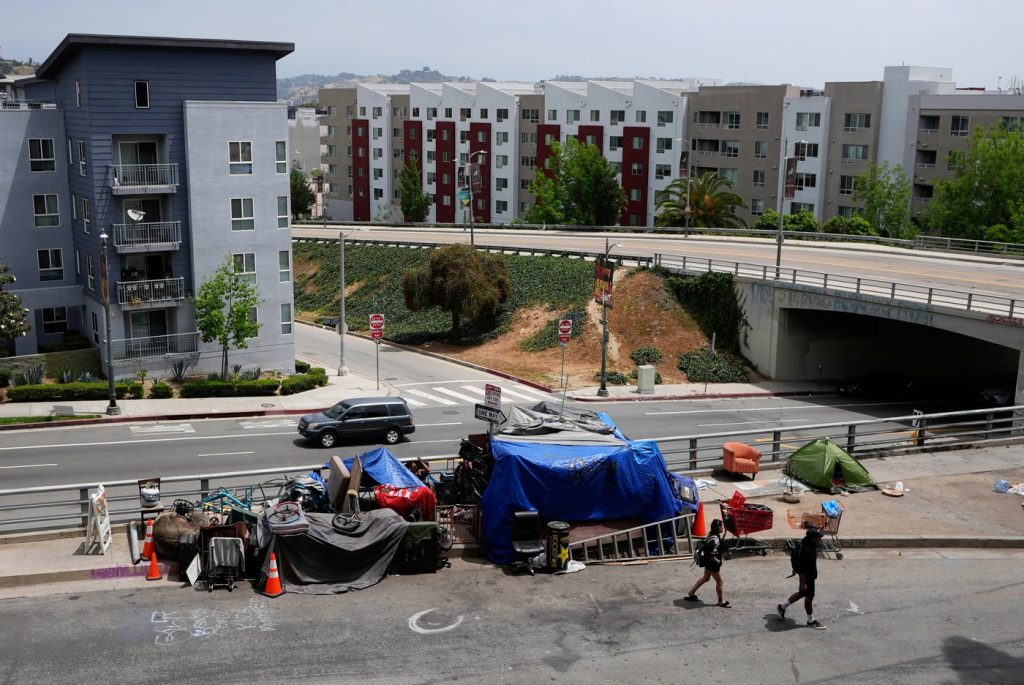SAN FRANCISCO (AP) – On Monday, California Governor Gavin Newsom intensified efforts to address homelessness by urging cities to clear encampments that have become a prevalent issue along underpasses, parks, and streets throughout the state. This call to action came as he unveiled a comprehensive blueprint for a camping ban, designed for cities and counties to follow. During this announcement, Newsom also revealed more than $3 billion in grants aimed at creating facilities to support homeless individuals, including those grappling with mental health and substance use disorders.
At a news conference, Newsom expressed a sense of urgency, declaring, “No more excuses. It is time to take back the streets. It’s time to take back the sidewalks. It’s time to take these encampments and provide alternatives.” Since taking office in 2019, Newsom, a former mayor of San Francisco, has prioritized homelessness, seeking to address this long-standing issue that has typically fallen under the jurisdiction of local officials.
By advocating for a statewide framework for encampment bans, Newsom becomes the first Democratic governor to do so. California currently has over 187,000 individuals in need of housing, representing a quarter of the entire U.S. homeless population. This alarming statistic underscores the gravity of the issue at hand.
Last year, the U.S. Supreme Court made it easier for city officials to implement bans on homeless camping, a decision that was welcomed by many Democratic leaders but criticized by advocates for homeless individuals, who deemed it inhumane. Newsom's proposed ordinance prohibits “persistent camping” in one location and encampments that obstruct sidewalks. The framework encourages local authorities to provide notice and make significant efforts to offer shelter options before proceeding with encampment clearings.
Some major cities have already begun enforcing stricter measures on encampments. San Francisco Mayor Daniel Lurie has committed to cleaning the city's sidewalks, while San Jose Mayor Matt Mahan has suggested potential arrests for individuals who refuse shelter three times. Both of these Democrat-led cities are also increasing the number of available shelter beds.
In Los Angeles, Mayor Karen Bass has prioritized the clearing of encampments; however, makeshift tents and shelters remain commonplace throughout the city. Recent estimates from last year suggested that over 45,000 homeless individuals reside in Los Angeles alone.
Despite the push for encampment bans, critics argue that such measures could hinder homeless individuals' efforts to secure stable housing and employment. Jay Joshua, a resident at an encampment in Los Angeles, emphasized the importance of these spaces for some individuals, noting that they can provide a safe environment for those trying to rebuild their lives.
Alex Visotzky, a representative from the National Alliance to End Homelessness, expressed skepticism about the encampment ban, suggesting it may divert attention from a state budget that lacks sufficient funding for long-term housing solutions. Additionally, organizations representing California's cities and counties have asserted that they are not solely responsible for the crisis, citing the need for sustained financial support to effectively combat homelessness.
Carolyn Coleman, Executive Director of the League of California Cities, stated that while clearing encampments may attract attention, addressing the fundamental causes of homelessness is essential to prevent a cycle of recurring issues. Meanwhile, California’s State Association of Counties criticized the state for not providing adequate funding to tackle homelessness effectively, highlighting that a significant portion of available funds has been allocated to housing developers rather than directly addressing the needs of those experiencing homelessness.
Despite these challenges, housing and homeless advocates have praised Newsom for his continued efforts to push local governments to increase housing availability, particularly for the unhoused population. He has also endorsed a voter-approved initiative aimed at boosting treatment options for individuals with severe mental health and substance abuse challenges to prevent them from becoming re-incarcerated or returning to the streets.
Yet, the struggle to deliver visible results persists. An audit conducted last year revealed that although California allocated $24 billion toward more than 30 programs aimed at reducing homelessness between 2018 and 2023, it lacked comprehensive data to evaluate the effectiveness of these initiatives.












